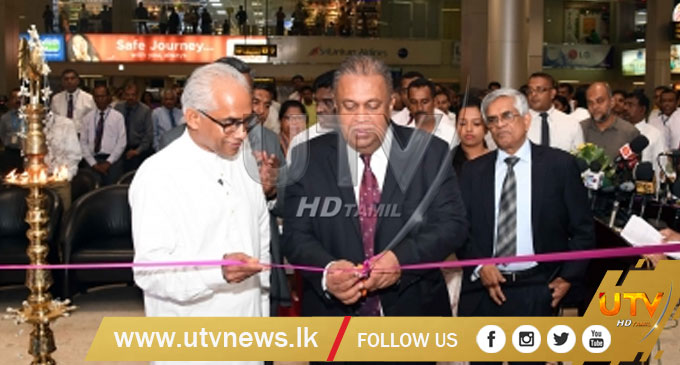(UTV|COLOMBO) – VAT is an end user consumption tax, and therefore should not be applied to goods and services that are consumed outside of Sri Lanka. By introducing such a TVR scheme, Sri Lanka will be aligning itself with international best practices Mangala Samaraweera, Minister of Finance and Media said yesterday (11th).
At the Opening of the Tourist VAT Refund Scheme (TVRS) at the BIA the Minister further said that the Tourist VAT refund scheme is a 2018 Budget proposal which will provide a significant boost for the tourism sector and the retail sector. The TVRS will enable Sri Lankan goods to have greater exposure to the global market, bringing with it several positive economic spill overs.
Following ist of his speech:
It is a pleasure to address you at this important and highly anticipated event. It is always satisfying to witness proposals from the budget coming to fruition. We speak a lot about the importance of improving tax collection in Sri Lanka. This has been one of the biggest challenges faced by our government and I am pleased to note that we have made important improvements in tax collection and compliance. This will help our objectives of servicing outstanding debt repayments, but a lot more needs to be done.
At the same time, we are acutely aware of the importance of ensuring that taxation is fair, convenient, and as non-distortive as possible. To this end, the government will always give priority to the development of strategic industries. However, this will be done in a rules based manner, as opposed to ad-hoc incentives that have led to corruption and tax leakage in the past.
In the Inland Revenue Act itself we have provided significant concessions to sectors including tourism, exports, IT, education, and agriculture, all of which are taxed at 14% corporate income tax. This is in addition to the attractive capital allowances which provide a major tax break for new investments. The Tourist VAT refund scheme is a 2018 Budget proposal which will provide a significant boost for the tourism sector and the retail sector. The TVRS will enable Sri Lankan goods to have greater exposure to the global market, bringing with it several positive economic spill overs.
VAT is an end user consumption tax, and therefore should not be applied to goods and services that are consumed outside of Sri Lanka. By introducing such a TVR scheme, Sri Lanka will be aligning itself with international best practices. Neighbouring countries including Thailand and Singapore have become regional shopping centres, and utilising VAT-free shopping has been an impetus to this. Year around, tourists would visit increasingly for the sole purpose of shopping, and international retailers have as a result invested heavily in these countries. Sri Lanka has similar potential to exploit such opportunities, particularly considering its significant tourism assets over above shopping and retail.
The TVRS has a particular importance for enhancing the attraction of Colombo as a destination. Today most tourists tend to bypass Colombo for attractions outside of the capital city. But with the opportunity for VAT free shopping, tourists will have more reason to spend time in Colombo. Trends in other cities show that tourists that visit destinations for the sole purpose of shopping tend to spend significantly more than their counterparts that visit the rest of the country and they tend to stay at the destination longer than traditional tourists. Therefore, I believe that this would be the first step in unlocking a major potential for Sri Lanka.
The TVRS could also have benefits in terms of enhancing tax compliance. More firms will be incentivised to register to claim the privileges, thus improving formalisation of the economy. This scheme would also give the tax administration a greater insight to retail and tourism sectors. I expect the TVRS to provide a significant incentive for luxury retail operators in Sri Lanka. There are already a number of shopping destinations with major global brands beginning to establish in Sri Lanka – and this trend can only benefit and further expand with the tourist VAT refund mechanism. We look forward to seeing enhanced investments from this sector.
Since this is a new initiative, we may experience some initial teething issues in implementation. But I expect the officers of the IRD will take diligent measures to bring the system up to global standards within a very short period of time by adopting the best available technology and expertise. Improving the environment for Sri Lankan businesses has always been a priority for the government of Sri Lanka. By implementing policies such as this, we expect material benefits to accrue to the tourism industry, the retail sector, and the wider economy through indirect benefits.
I thank everyone who has been involved in the implementation of this project, specially Commissioner General Mr. Ivan Dissanayake, who will be retiring in a few days’ time. While wishing him a happy retirement, I look forward to work closely with the staff of the IRD to ensure the successful operation of this new scheme.
Courtesy : news.lk
[alert color=”faebcc” icon=”fa-commenting”]Keeping up to date with breaking news while you are on the move is now simple with UTV Alerts [textmarker color=”8a6d3b”]Type REG UTV and send to 77000[/textmarker] on your Dialog, Airtel, or Hutch mobile connection[/alert]

